Lindsey Duncan
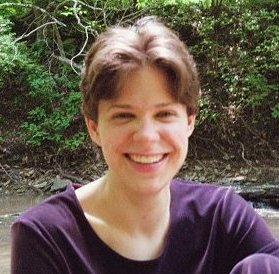 |
LINDSEY DUNCAN is a life-long writer and professional
Celtic harp performer, with short fiction and poetry in
numerous speculative fiction publications. She feels that music
and language are inextricably linked. She lives, performs and
teaches harp in Cincinnati, Ohio.
|
New Title(s) from Lindsey Duncan
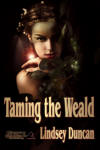
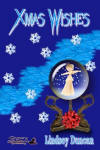
Click on the thumbnail(s) above to learn more about the book(s) listed.
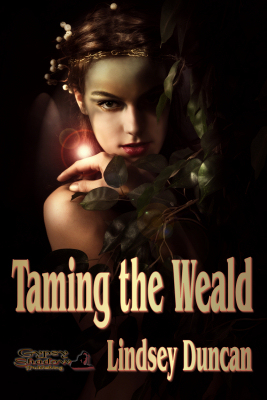 |
Timid Keryn wants nothing more than to be a mother.
Within the Weald—the last bastion of nature on the space
station that serves as her home—she encounters Verdant, a
daughter of that forest who has somehow survived without
parents or community. Keryn tries to prepare the girl for
life in the station, but Verdant has strengths and secrets
of her own.
Excerpt
Word Count:
8450
Buy at:
Smashwords (all formats) ~
Barnes and Noble
~
Amazon
Price: $ .99
|
| |
|
Reviews
From
Aubrie Dionne on Amazon |
|
| |
|
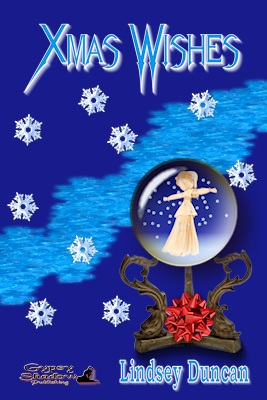 |
As Christmas approaches, Irena Maddox
faces typical teenaged problems: her mother is half the
world away, the boy of her dreams doesn’t know she exists,
and it doesn’t even have the decency to snow. Then she meets
her eccentric new neighbor, Moira, and everything seems to
change. But is there something more to her run of good luck... and to Moira?
Excerpt
Word Count: 7445
Buy at:
Smashwords (all formats) ~
Barnes and Noble ~
Amazon
Price: $ .99
|
Excerpts |
Taming the Weald |
Keryn pressed her back against the wall under the ventilation
pipe and tried to make herself smaller as the three gossips
wandered up the space sta-tion corridor. Common sense—even the
fringes of the Weald were dangerous—warred with the hot flush of
embarrassment working up from her stomach.
“... third time she has requested a child.” The voice belonged
to Nila, a cloth-constructor.
“Denied?”
“Of course. The matchers have no time for her.”
“And she still wants to try?”
Of course she did. Keryn didn’t mind if it was a boy or girl,
from her genetic stock or not—who would want big feet, a flat
face, and coarse, almost colorless hair?—she simply wanted a
child.
Hearing Nila’s derisive laughter, Keryn pushed off the wall and
rounded the corner. An ominous spectre of green swept out before
her. Sneaking tendrils of grasses and flowers gave way to
crouching shrubbery and then the trees: dark, deadly giants
whose leaves cast shadows more treacherous and uncertain than
the comforting black of space.
The fence was perfunctory. Station denizens knew better than to
enter the Weald. She scrambled over, hearing the weird crunch of
grass under her feet. The smell was acrid, unpleasant. The
ground seemed to wobble underfoot, con-stantly out of sync with
what she expected. She was thankful she didn’t have far to go to
take cover behind a bush.
Keryn pulled her arms in, protecting herself from the leaves.
She knew the greenery was poisonous to eat, not whether it was
harmful to touch, but why take chances? If nothing else, it
might cause a rash. She felt a surge of wistful-ness. These were
wisdoms a mother passed on. Safety, care—not attributes she
displayed now.
The gossips meandered into view. “I heard the matchers told her
that her work quality needed to be higher,” Nila said, “but she
won’t—or can’t—improve it.”
Keryn flushed, pressing against the unsanitary dirt before she
remembered herself. She was dedicated to her work with
food-synth machines. Nothing broke down on her watch—ever. That
was more than many operators could say.
As the gossips moved on, she became aware the Weald was not
silent, as she had originally assumed. The noise was not the
familiar thrumming of the pipes, but a crackling, rustling, the
whistle of air movement. Could there be creatures living here?
Surely the station leaders would have plundered the Weald had
there been any evidence of uncontrolled organic life.
Then she heard it: a cry of pain.
Keryn leapt up, flashing a look towards the gossips, but they
were too far away. The voice sounded young and fearful, and that
was enough to impel her over a log and into the inky-green
shadows.
The Weald resisted her: branches reaching for her face, the
ground swerving away from her feet. She stumbled, drawn on by
the voice even as the rest of her panicked.
She broke through the trees into an open patch. Two massive
thorn bushes twined together as if fighting, and twisted up in
their martial embrace was a girl.
At first, it was hard to tell where foliage ended and girl
began. Leaves and vines clothed her form, woven as neatly as
Nila’s work, and her skin betrayed a faint green flush, as if
lit from within. She couldn’t have been older than ten or
eleven, and Keryn felt a surge of protectiveness before
questions set in: who was she? How had she gotten here? It
couldn’t be recent, not with the clothes and the way her body
seemed to harmonize with her surroundings.
The girl twisted, whimpering. As she did, Keryn noticed a
spindly branch had pushed its way into her calf, blood flowing.
“I’m going to help you,” Keryn said, approaching with her hands
spread. “You need to stop struggling.”
The girl started, head snapping up. Her body went still,
quivering with nerves. Dark, animal eyes watched Keryn as she
knelt down, unwinding branches and pulling other thorns free.
Keryn winced when a branch snapped back and stabbed her. Poison!
She pushed down the panic.
“You’ll be fine,” she continued in what she hoped was a soothing
tone. “Just a few scratches. Give me a moment and you’ll be
free, I promise.”
The girl regarded her, the puff of her breath slowing. She still
didn’t speak—could she speak?
Keryn soon untangled the leg except for the embedded branch. She
gazed up at the sweet, smooth face and swallowed.
“I need to pull this out,” she said. “It will hurt. Trust me?”
Those deep feral eyes widened. The girl nodded.
She understands me, Keryn thought. I hope. She braced her hand
on the branch and pulled.
The girl shrieked. The sharpened end slid out, slick with blood.
Keryn sank back, hands shaking. She daubed the blood away with
her sleeve.
“It’s all right,” she said. “It’s out.” Her heart smacked
against the inside of her chest. “What’s your name?” She didn’t
expect an answer.
“Verdant.” The girl’s voice was clear, unwavering. “Thank you
for helping me.”
“We’re not done,” Keryn said, “I need to free your arms.”
Verdant shook her head. “Now that it’s not hurting as much, I
can think,” she said. “I can do—this.”
|
| Back to
Taming the Weald |
Xmas Wishes |
Irena Maddox slowed as she passed her neighbor’s garage, trying
to catch a glimpse of the contents of the new woman’s life.
Since the end of summer, the newcomer had lived in isolation
behind the metaphorical moat of her property line. The welcoming
committee tried three times to bring her into the community and
finally settled for leaving a fruit basket on the doorstep.
Bravely, Irena had stolen a kiwi. No one ever missed kiwi.
She felt that same defiance as she peered into the garage. There
was no room for a car. Moira Alban didn’t seem to own one, and
in fact, Irena had never seen her en route to anywhere. Uneven
stacks of boxes filled the shadows. She squinted, hardly
noticing she had halted and could no longer use the excuse she
was wandering by.
The boxes were labeled, Xmas Decorations—Fragile, and similar
phrases. Irena knew some people wouldn’t write the word
Christmas out: something to do with the first half being
irreverent or not. Her mother would know, but she was never
around to pack boxes. Irena wasn’t sure what was worse: her
mother’s long absences, or how little she knew about what
happened during them.
So the boxes were ordinary. The only thing they told her was
Moira put up Christmas decorations—and Irena wasn’t sure there
was anyone who didn’t, whether they celebrated or not—and she
was the kind of person who didn’t spell the word out, whatever
that meant. Maybe she was lazy. Maybe the reason no one knew
anything about her was there wasn’t anything interesting to
know.
The winter cold impelled her to decision. Instead of scampering
onward to her house, to a superstitious grandmother and another
holiday that wasn’t, she scuffed up the driveway, moving as
subtly as one could while wearing a bright red jacket and
towering like a scarecrow. Probably all the boxes were sealed,
but if one was already open, or if maybe it had only a little
bit of tape...
Her fingers scrabbled at a cardboard flap, pulled it free. The
box was full of snow globes; the tap she had given the box
caused endless blizzards within. She scooped one out. Instead of
the expected scene inside—a cute snowman or a foreign
landmark—there was a little cornhusk doll...
“What are you doing?”
Irena yelped and dropped the globe. It pinged off the concrete.
She whirled to face her accuser, a flush burning her cheeks.
Moira Alban towered, somewhere in the infinite expanse of middle
age, with auburn hair and eyes the color of storms. “Well, if it
isn’t the girl who stole the kiwi,” she continued.
“I did not,” Irena said by reflex, and then bent for the
snow-globe. “I was just curious...”
She hadn’t seen the globe roll, but Moira picked it up from her
feet and cradled it like something precious. “Do you understand
the hazards of curiosity?”
In the chill and shadow of the garage, the words seemed
menacing. Irena drew back, heart pounding with a rabbit’s fear... even though she could easily have dodged past, even though
hers was the next driveway over and kids shouted in the yard
across the street.
“Killed the cat,” Irena said bluntly, and wished she hadn’t. Her
skin prickled, even as her mind shouted at her it was
ridiculous. Neighbors didn’t attack each other for picking
through boxes, and the garage door had been open. Surely that
was an invitation. And besides, how would Moira hurt her?
Moira laughed, a rich sound. The menace evaporated. “Not the
most original answer, but it will do. Since you’ve meddled with
my boxes, you can help me carry them inside. Come, child.”
Though Irena bristled at the label, her relief, silly as it was,
kept her from protesting. She picked up the nearest box and
followed Moira inside. The coolness of the house surprised her,
though still a relief from the Midwest bluster.
The house was spartan, furnished in white with few
distinguishing marks—no hanging pictures, no mirrors, no
knick-knacks. The other thing missing was peculiar in itself: no
television, no computer, no electronics. The phone even had an
old-fashioned cord. Up until then, Irena had thought they no
longer made phones like that.
Moira directed her to the foot of a massive fir tree. After the
fourth trip, she seemed satisfied. “Take off your coat,” she
said, “and I’ll make you hot chocolate.”
Poof: you’re hot chocolate, Irena muttered. “Thanks,” she said
aloud with a wary smile, not sure her intrusion had been
forgiven, but it wasn’t like the woman would poison her just for
peeking in some boxes. Especially not after she had carried them
in. She eeled out of the coat, but had trouble with the sleeves.
They ended up tucked inside themselves.
Moira started a kettle of water. “Tell me about yourself,” she
invited. “What school do you attend?”
Irena wanted to retort she was more interested in finding out
about Moira, but answered that question and those following
politely, even as she scanned the room for personal touches. She
came up blank. Christmas decorations would do the house good.
“What about your family?”
“Grandparents. Mom sometimes,” Irena said. “My grandfather’s a
retired something-or-other.” Military, she always assumed. He
occasionally referred to the war, but never answered questions.
She wished he spoke more; at least enough to put a stop to her
grandmother’s superstitious quirks, like hanging a horseshoe
over the door and throwing salt over her shoulder. Who did that
these days? Besides that, guess who had to sweep up the salt.
“So your mother’s away?”
It was not Irena’s favorite subject. “Yeah. Work.”
Moira arched an eyebrow. “Even on holidays?”
“Sometimes,” Irena said. “Christmases, even.”
Had it been her imagination, or had Moira shuddered? Certainly
she drew back, but that was only to remove the kettle from the
heat. “And this year?”
“Could be.” Irena cast about the kitchen, looking for a
conversation point. It was like finding a toy boat on the ocean.
“So, uh, what do you do?”
“Whatever comes my way,” Moira said. “Primarily, I help people
with long-term plans.”
Irena frowned, trying to figure out what Moira’s answer meant.
“So like—investments or something?”
“Something,” Moira agreed.
|
| Back to Xmas
Wishes |
|
top
|
